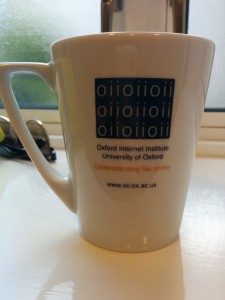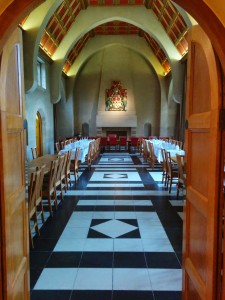Today was the first of our SDP meetings. I discovered that there is some merchandise I would like to purchase. 
After going around to do the typical academic introductions, Mark Graham, OII faculty, presented some of his recent research regarding internet geographies. Focusing mostly on Wikipedia, he spoke about the uneven user generated content (UGC) representation of both specific places in the world and of people from those places, specifically the global south. Much content creation and editing is included about European states and the US, and much content is written about these places, but they dominant the UGC culture. This can be dangerous when sites such as Wikipedia and Yahoo claim to be “the sum of all human knowledge.” The sites are virtual mirrors that reflect very specific realities back to not only those who have never experienced these places for themselves, but also to people who live there. You can see his work here.
One question I thought of while listening to Mark speak was about the structure of a space like Wikipedia. Western countries have a very specific tradition when it comes to relaying knowledge and telling stories. We believe it is the “right” way of retrieving “valid” information. However, other cultures relay knowledge and share narratives in different ways. For example, a culture may value telling stories and using many very culturally specific terms or metaphors. These may make no sense to outsiders or when translated to other languages. Therefore, perhaps a space like Wikipedia just simply cannot support a different kind of knowledge production and sharing. I wonder how this kind of research could be carried out and what the implications would be for Mark’s, and other internet geography, work.
We had three student presentations today. The first was Misha Teplitskiy, and he presented his research on evaluating scientific findings. Using peer review data from sociological journals, he is trying to understand how fruitful and predictive the peer review process actually is. I found that a question he posed at the end of his talk to be very interesting: what does this all mean when we start to think about the internet and a post-peer review culture?
Second was Renee Powers who spoke about her time conducting an online ethnography of Youtube vloggers. By both participating in a 30-day, vlog every day, challenge, and subscribing to 25 participant’s accounts, she found some interesting results surrounding why people vlog, how they think about privacy, and the unpleasantries surrounding vloggers seeing that they are so open with their lives. She even shared one fascinating story about a male who was harassing her through multiple-media and the seasoned vlogger who apologized for this misogynistic behavior. One aspect that she found extremely creepy about his harassment was that he found her on Facebook, even though her vlogging self had no direct connection. This reminds me so much of my own work with “anti-anonymous” online spaces. Vlogging, unless you hide your face, obviously makes it quite hard to be anonymous. You can follow her vlogging updates while she dissertates @ReneeVlogs.
Lastly, Luiz Costa spoke about “privacy, data protection, and capabilities in a world of ambient intelligence.” Specifically focusing on the capability approach, he explained that he is trying to foster some objective process of curating online rights. Generally, he is attempting to find a framework to evaluate individual well-being. Luiz is an acting lawyer, and I found his perspective very enlightening. Further, as someone who only really works with US legislation, it was interesting to learn more about the processes of European law, digital spaces, and human rights.
After a great first session, we had a wonderful welcome dinner at Nuffield College. You can see the awesome dining hall below!

